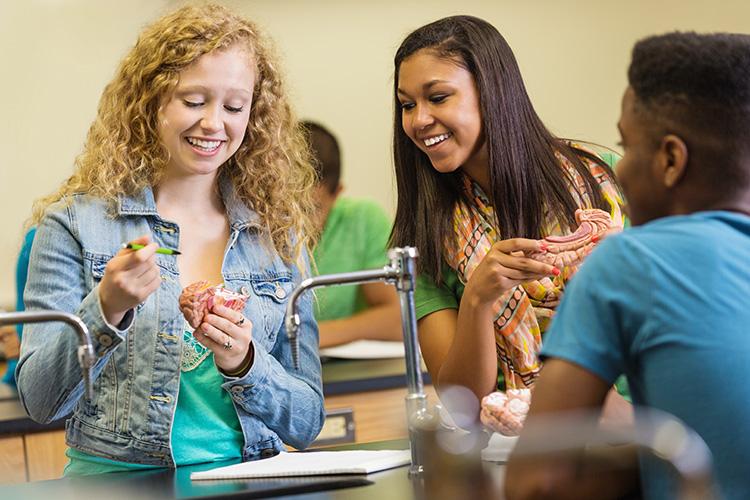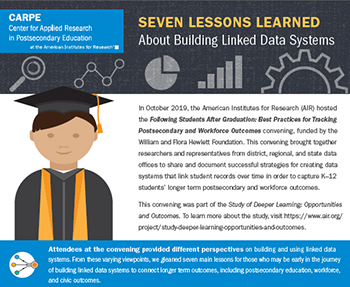Study of Deeper Learning: Opportunities and Outcomes

The combination of (1) a deeper understanding of core academic content, (2) the ability to apply that understanding to novel problems and situations, and (3) the development of a range of competencies, including collaboration skills and self-management, is called deeper learning. The William and Flora Hewlett Foundation—a leader in the national initiative to promote deeper learning in schools—has defined deeper learning as “a set of competencies students must master in order to develop a keen understanding of academic content and apply their knowledge to problems in the classroom and on the job.”
The Study of Deeper Learning: Opportunities and Outcomes examines how some schools have provided opportunities for students to acquire deeper learning skills and how these opportunities are related to student outcomes. The deeper learning theory of action assumes that opportunities to engage in deeper learning activities help students to develop three types of deeper learning competencies: cognitive (mastery of core content, critical thinking skills), interpersonal (collaboration skills, communication skills), and intrapersonal (learning-how-to-learn skills, academic mindsets). It is through the development of these competencies that deeper learning opportunities can influence students’ achievement in and graduation from high school, college enrollment and degree completion, and longer-term workforce outcomes and civic engagement.
Funded by the Hewlett Foundation, the Study of Deeper Learning includes 20 high schools that focus on deeper learning skills (“network schools”) as well as a matched sample of comparison (“non-network”) schools. All twenty schools belonged to one of ten deeper learning networks and had a mature and at least moderately well-implemented approach to promoting deeper learning.
In a series of publications, AIR researchers compare the strategies and cultures, students’ deeper learning opportunities, and student outcomes between students who attended network schools and non-network schools. The research team also conducted exploratory analyses to examine relationships among opportunities for deeper learning, deeper learning competencies, and students’ on-time high school graduation. In addition, equity briefs explore whether opportunities for deeper learning were evenly distributed across students attending network and non-network schools, and whether relationships between opportunities for deeper learning and interpersonal and intrapersonal competencies were similarly positive for all students.
In 2018, AIR launched a follow-up study that examined the impact of deeper learning on students’ civic engagement, college, and early workforce outcomes 6 years after high school graduation. As part of this follow-up study, AIR hosted a convening during which AIR researchers engaged in discussion and collective problem solving with representatives from districts, states, and regional organizations to inform the development of comprehensive state and district data systems that include longer-term outcomes. The resulting white paper, Following Students After Graduation: Best Practices for Tracking Postsecondary and Workforce Outcomes, highlights features of participants’ data systems; shares reasons for the development of longitudinal data systems that capture longer-term outcome data; presents strategies and considerations for developing effective data systems; and offers suggestions for moving this work forward.
Briefs and Reports
Does Deeper Learning Improve Longer Term Outcomes for Students?
Brief, June 2022 (PDF)
Five years after releasing the initial study findings, the Study of Deeper Learning research team collected additional data to examine the longer term impacts of attending deeper learning network high schools on postsecondary educational attainment, civic engagement, and workforce outcomes. This second phase of the study also explored relationships between students’ self-reported opportunities for deeper learning and deeper learning competencies in high school (as measured by a survey administered when students were juniors or seniors in high school) and college, civic engagement, and workforce outcomes in young adulthood.
The Study of Deeper Learning: College Enrollment, Persistence, and Degree Completion in the First 6 Years After High School
Report #7, June 2022 (PDF)
This report examines longer term impacts of attending deeper learning network high schools on college enrollment, persistence, and degree completion up to 6 years after high school. AIR researchers also explore whether students’ self-reported opportunities for deeper learning and deeper learning competencies in high school significantly predict degree attainment regardless of the type of high school students attended. Technical appendix (PDF)
Deeper Learning and Civic Engagement and Workforce Outcomes
Report #6, May 2021 (PDF)
To examine longer-term impacts of attending deeper learning network high schools, AIR researchers launched a follow-up survey to a subset of participants from the original Study of Deeper Learning in summer 2019 and conducted phone interviews with 20 study participants in fall 2020. The follow-up survey (PDF) was administered 5–6 years after study participants’ expected high school graduation. In this report, AIR researchers examine whether attending a deeper learning network school has a significant impact on students’ longer-term civic engagement and workforce outcomes. Additional analyses explore whether students’ opportunities for deeper learning in high school significantly predict these longer-term outcomes regardless of the type of high school students attended. Technical appendix (PDF)
Equitable Opportunities for Deeper Learning: Exploring Differences Between Traditional and Network Schools
Equity brief, June 2020 (PDF)
In this brief, AIR researchers use data from the Study of Deeper Learning to examine whether students attending deeper learning network schools reported more equitable learning opportunities than students attending matched non-network schools. First, they examine the extent to which students who were enrolled in the same high school varied in their self-reports of opportunities for deeper learning and whether the within-school variation in opportunities differed between network and non-network high schools. Second, they test whether students’ self-reports of opportunities for deeper learning differed for different types of students enrolled in the same school—especially traditionally underserved students (e.g., Black and Hispanic students and students who are eligible for free or reduced-price lunch).
Equitable Access to the Interpersonal and Intrapersonal Benefits of Deeper Learning
Equity brief, June 2020 (PDF)
Prior reports from the Study of Deeper Learning revealed that students’ self-reports of opportunities for deeper learning in high school were positively associated with their interpersonal and intrapersonal competencies (e.g., collaboration skills, self-efficacy). In this brief, AIR researchers explore whether students’ opportunities for deeper learning are similarly beneficial for different types of students (e.g., male and female students, English language learners and native English speakers).
School Features and Student Opportunities for Deeper Learning: What Makes a Difference?
Report #5, October 2016 (PDF)
This report extends earlier findings by investigating the potential facilitating role of certain school features in schools’ ability to provide deeper learning opportunities for their students. Researchers examined teachers’ survey responses related to their own beliefs about teaching, their assessment of their peers’ professional culture, and their assessment of the success of the principal in providing instructional leadership and program coherence. They then asked whether these features help to explain variation in students’ reports of their opportunities to engage in deeper learning in their core classes.
Deeper Learning and High School Graduation: Is There a Relationship?
Report #4, August 2016 (PDF)
In this report, the authors extend the analyses from the original study to explore the connections between deeper learning opportunities, deeper learning competencies, and high school graduation. The findings indicate that students’ opportunities to engage in deeper learning and the deeper learning competencies they developed were positively associated with graduating from high school, but the ways in which deeper learning opportunities and competencies were connected to graduation differed across study locations.
Evidence of Deeper Learning Outcomes
Report #3, September 2014 (PDF)
This third report focuses on whether students who attended selected network schools had more positive educational outcomes than their matched counterparts who attended similar non-network schools. In particular, the report addresses two key questions: (1) Did students who attended the selected network schools achieve better outcomes than would likely have been the case had they not attended the network schools? and (2) Were the impacts of attending a network high school similar for all students who attended these schools, or did certain subgroups of students differentially benefit from attending these schools?
Technical appendix (PDF)
Updated Findings Based on this Report:
- Graduation Advantage Persists for Students in Deeper Learning Network High Schools
Brief, March 2016 (PDF)
UPDATED FINDINGS: Are students attending deeper learning network schools more likely to graduate from high school than similar students in matched non-network schools?
Technical appendix (PDF)
- Deeper Learning and College Enrollment - What Happens After High School?
Brief, August 2016 (PDF)
UPDATED FINDINGS: Are students attending deeper learning network schools more likely to enroll in college than similar students in matched non-network schools?
Technical appendix (PDF)
Providing Opportunities for Deeper Learning
Report #2, September 2014 (PDF)
In this report—the second in the series—the authors focus specifically on the opportunities that students experienced to engage in deeper learning in their classrooms.The key question research question that this report addresses is, "Did students who attended the selected network schools experience more opportunities to engage in deeper learning than would likely have been the case had they not attended the network schools?"
Technical appendix (PDF)
The Shape of Deeper Learning: Strategies, Structures, and Cultures in Deeper Learning Network High Schools
Report #1, September 2014 (PDF)
What strategies, structures, and cultures are common among deeper learning network high schools, and how do they differ from those observed in non-network high schools? In this report, the authors focus on the assumption that educators can design/redesign schools’ instructional strategies, structures, and cultures to explicitly focus on deeper learning. The goal is primarily descriptive—to provide a picture of the strategies and structures the adults in the sampled network schools used to foster deeper learning.
Technical appendix (PDF)
____________________
Creative Commons License
The Study of Deeper Learning: Opportunities and Outcomes Student Survey Documentation and Teacher Survey Documentation by American Institutes for Research is licensed under a Creative Commons Attribution-NonCommercial-NoDerivatives 4.0 International License.
Permissions beyond the scope of this license may be available at copyright_PS@air.org.

